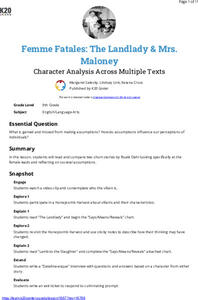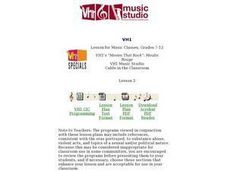Redefining Progress
Have and Have-Not
Is there a correlation between a country's wealth and the extent of its ecological footprint? What exactly constitutes an ecological footprint, and how does one country stack up against the rest? This is a unique lesson to incorporate...
National Endowment for the Humanities
Harriet Jacobs and Elizabeth Keckly: The Material and Emotional Realities of Childhood in Slavery
Young historians learn how to make generalizations based on primary sources in a lesson that uses the autobiographies of two women born into slavery. The class watches a historical re-enactment of scenes from the lives of Harriet Jacobs...
National Endowment for the Humanities
Dramatic Perspective in Moby Dick
A lesson on Herman Melville's Moby Dick asks readers to compare the first person point of view of Ishmael in Chapter 1 to Captain Ahab's dramatic monologue in Chapter 37. Readers cite evidence from the chapters to support their analysis...
Newseum
Civil Rights: Chronicling the Movement
Scholars investigate events in the civil rights era in their community and develop a multimedia presentation of their findings. They compare local events with national events discussed on a NewseumED timeline.
K20 LEARN
The Bank Of Justice: Civil Rights In The US
To launch a study of racial segregation and integration, young historians first watch a news video about a prom in Georgia that was first integrated in 2013. They then compare the goals in Lincoln's Gettysburg Address to King's "I Have a...
National Endowment for the Humanities
The Metamorphoses and Genesis: A Comparison of Creation-Flood Stories
Creation and destruction. Scholars use a Venn diagram to compare the creation story in Ovid's The Metamorphoses with that in the book of Genesis. Pupils then note differences between the two texts and offer suggestions for why the texts...
Academy of American Poets
Teach This Poem: "The Metier of Blossoming" by Denise Levertov
Poetry analysis need not be a lugubrious exercise for young learners. The approach used with Denise Levertov's poem, "The Metier of Blossoming" is one of close observation, of noticing and reflecting on the words, phrases, and images the...
K20 LEARN
Femme Fatales - The Landlady and Mrs. Maloney: Character Analysis Across Multiple Texts
Two stories by Roald Dahl, "Lamb to the Slaughter" and "The Landlady" provide readers an opportunity to compare stories by the same author. After a close reading of the stories, teams select a character from one of the tales, craft...
Academy of American Poets
Teach This Poem: "somewhere i have never travelled,gladly beyond" by E. E. Cummings
Scholars engage in a role-play exercise, compare their demonstration to a time-lapse video, and to a poem by E.E. Cummings. The ensuing discussion asks learners to consider the similarities among the three.
VH1
Lesson 2: Moulin Rouge
The pop movie Moulin Rouge was based on the opera La Boheme. Learners watch the last 30 minutes of each musical to compare and contrast social opposites. They'll first discuss the social differences of the main characters and how those...
Curated OER
Past, Present and Future Through the Eyes of Long Jakes
Even the littlest learners can become art historians if they have the right training. For the lesson, your preschoolers discuss the piece Long Jakes as they point out all the details they notice. They discuss what mountains and mountain...
Teach Engineering
Tissue Mechanics
Engage your class by showing them how silly putty and human tissues are alike. Pupils learn more about tissue mechanics by reflecting upon their experiences with silly putty. The lesson covers collagen, elastin, and proteoglycans and...
Torrey Maldonado
Anti-Bullying & Conflict-Resolution Lesson
Invite your class to consider how to respond to a conflict. Designed to be used alongside Secret Saturdays by Torrey Maldonado, a lesson plan focuses on a set of terms: conflict, escalate, deescalate, conflict resolution, denial, and...
Center for Learning in Action
Water – Changing States (Part 2)
Here is part two of a two-part lesson in which scholars investigate the changing states of water—liquid, solid, and gas—and how energy from heat changes its molecules. With grand conversation, two demonstrations, and one hands-on...
National Endowment for the Humanities
Literary Genres in “Moby-Dick”
Moby Dick is more than a whale of a tale narrated by Ishmael. A lesson studying Herman Melville's classic novel asks readers to examine the different genres the author weaves into his story. Instructors model how to conduct a stylistic...
K20 LEARN
Antigone's Themes Today: The Greek Drama Antigone
Is Antigone relevant to today's readers? After reading Sophocles' tragedy, scholars must decide if the themes are universal and timeless. Class members engage in a series of activities designed to have them closely consider the...
Academy of American Poets
Teach This Poem: “Crisscross” by Arthur Sze
Arthur Sze's poem "Crisscross" launches a lesson that asks scholars to use their observation skills. They first draw an image that reflects what crisscross means to them. They then examine a photograph of a lightning strike and list what...
Curated OER
Lesson: Living For The City
Both Money and Cummings were able to capture the essence of Paris. Critical thinkers analyze how each artist used his medium to describe the same place in a different way. Kids then write a Cummings-style poem about Monet's Waterloo Bridge.
Curated OER
Energy Crisis: Then and Now
Using political cartoons, scholars analyze the energy crisis of the 1970s and '80s, comparing and contrasting it to current tensions with oil. Display the 6 cartoons (linked) to the class, and demonstrate analysis using the worksheet...
Curated OER
Through Many Lenses: How are Countries Depicted by the Media?
If you plan to utilize the ABC miniseries, "The Path to 9/11" in your classroom, consider incorporating media literacy and research skills. After (or while) learners view the series, they discuss ways information can differ from source...
Curated OER
What Is the True Story of the Three Little Pigs?
Cozy up and listen to a recording of The True Story of the Three Little Pigs and The Three Little Javelinas. Then, lead your class in a compare and contrast of the two stories by creating a Venn diagram.
Curated OER
Analyzing Poetic Devices: Robert Hayden's "Those Winter Sundays" and Theodore Roethke's "My Papa's Waltz"
Analyze the poetic devices used in Robert Hayden's "Those Winter Sundays" to those found in Theodore Roethke's "My Papa's Waltz." Critical analysts discuss poetic meter and rhythm and its relationship to theme. They compare and contrast...
Curated OER
Beowulf: Songs of Ancient Heroes
Introduce your class to epic heroes with these activities for Beowulf. After watching a video clip, taking notes on heroes, and tracking characteristics of heroism throughout Beowulf, class members retell an episode of Beowulf using a...
Curated OER
Write like David Shannon
Students distinguish various books by David Shannon from other authors, compare three of Shannon's books for similarities, list various possible settings for stories, integrate Shannon's pattern of writing into their own, and formulate...

























